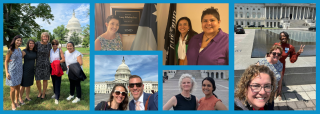Participating in nonprofit Lobby Days at your state or the U.S. Capitol offers powerful opportunities to advocate for solutions that address community needs. Likewise, every engagement with elected officials and their staffs is an opportunity to explain your mission and impact, even when making an ask on a legislative proposal.

Many organizations, including the National Council of Nonprofits (NCN), state nonprofit associations, and national organizations with local affiliates, convene lobby days at the federal and/or state capitol. The goals are to bring collective action, emphasize the importance of policy issues, and build relationships.
Normally, the organization convening the Lobby Day event conducts briefings for the nonprofit participants in advance, prepares materials for individual participants to leave behind after the meetings with elected officials and staff, and collects information from participants on how their meetings went.
For example, last week nonprofit representatives from more than three dozen states conducted over 100 meetings in Senate and House offices during NCN's Lobby Day on Capitol Hill in Washington, DC. They advocated on important and timely issues of concern for the entire nonprofit sector, as reflected in the following “leave-behind” materials:
- Charitable Giving Incentives (regarding the Charitable Act (S. 566/ H.R. 3435))
- Government Grants Reform (regarding the Streamlining Federal Grants Act (S. 2286/ H.R. 5934))
- Charitable Nonprofits: Nonpartisan in Law, Fact, and Purpose
- Nonprofit Workforce Data Needed from the Bureau of Labor Statistics
As a direct result of the lobbying that occurred in those meetings, more Members of Congress agreed to co-sponsor the bills. The conversations during those meetings also brought attention to the important need for Congress to protect nonprofits from partisan attacks and to prompt the federal Bureau of Labor Statistics to collect and report nonprofit workforce data like BLS does for all other industries.
Of course, Lobby Day meetings have multiple purposes. Calling attention to key issues is certainly important. So are the relationships that the nonprofit advocates made – whether with a long-serving elected official or a right-out-of-college staffer – because those connections can pay dividends for years and decades to come. Here are three examples and reasons:
- Now that the elected officials and their staff know you and your organization exist, they are more likely to reach out to you and ask for your thoughts before introducing legislation rather than after – potentially giving you the chance to head off bad bills and saving the sector from the consequences.
- In legislative offices, ignorance is not bliss. They need to know the truth, whether data, stories, or both. Charitable nonprofits operate in communities and normally have a closer connection to the people than their elected representatives. The smart ones will turn to you to know what’s going on and what is needed.
- People change jobs. The brand-new staffer today may in 5, or 10, or 15 years be the Chief of Staff, or even the state of federal elected official. The fact that you knew them back when can’t be a bad thing.
Lobby Days give frontline nonprofits the opportunity to advance your own agendas, strengthen the charitable sector, and build relationships that can last a career. Thus, Lobby Days are not only effective, but – with that three-for-one return on investment – they are efficient uses of your time.
